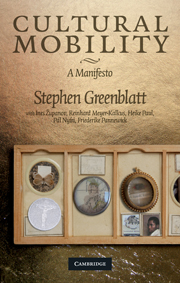Book contents
- Frontmatter
- Contents
- List of authors
- List of illustrations
- Acknowledgments
- 1 Cultural mobility: an introduction
- 2 “The Wheel of Torments”: mobility and redemption in Portuguese colonial India (sixteenth century)
- 3 Theatrical mobility
- 4 World literature beyond Goethe
- 5 Cultural mobility between Boston and Berlin: how Germans have read and reread narratives of American slavery
- 6 Struggling for mobility: migration, tourism, and cultural authority in contemporary China
- 7 Performativity and mobility: Middle Eastern traditions on the move
- 8 A mobility studies manifesto
- Index
- References
1 - Cultural mobility: an introduction
Published online by Cambridge University Press: 05 June 2012
- Frontmatter
- Contents
- List of authors
- List of illustrations
- Acknowledgments
- 1 Cultural mobility: an introduction
- 2 “The Wheel of Torments”: mobility and redemption in Portuguese colonial India (sixteenth century)
- 3 Theatrical mobility
- 4 World literature beyond Goethe
- 5 Cultural mobility between Boston and Berlin: how Germans have read and reread narratives of American slavery
- 6 Struggling for mobility: migration, tourism, and cultural authority in contemporary China
- 7 Performativity and mobility: Middle Eastern traditions on the move
- 8 A mobility studies manifesto
- Index
- References
Summary
In the latter half of the twentieth century many in the social sciences and humanities gleefully proclaimed the demise of a set of traditional assumptions about cultural identity. Notions of wholeness, teleological development, evolutionary progress, and ethnic authenticity were said to have been dismantled forever. A few lamented their passing, but most scholars energetically grappled with brave new theories of hybridity, network theory, and the complex “flows” of people, goods, money, and information across endlessly shifting social landscapes. But as the new century unfolds, it has become increasingly clear that the bodies of the deceased have refused to stay buried: those who thought to have bid farewell once and for all to the heavily guarded borders of the nation-state and to the atavistic passions of religious and ethnic identity find themselves confronting a global political landscape in which neither nationalism nor identity politics shows any intention of disappearing. While the older conceptions of rootedness and autochthony seem intellectually bankrupt, the heady theories of creative metissage have run aground upon the rocks of contemporary reality.
There is an urgent need to rethink fundamental assumptions about the fate of culture in an age of global mobility, a need to formulate, both for scholars and for the larger public, new ways to understand the vitally important dialectic of cultural persistence and change. This dialectic is not only a function of triumphant capitalism, free trade, and globalization; it is, as we hope to show, a much older phenomenon.
- Type
- Chapter
- Information
- Cultural MobilityA Manifesto, pp. 1 - 23Publisher: Cambridge University PressPrint publication year: 2009
References
- 8
- Cited by



